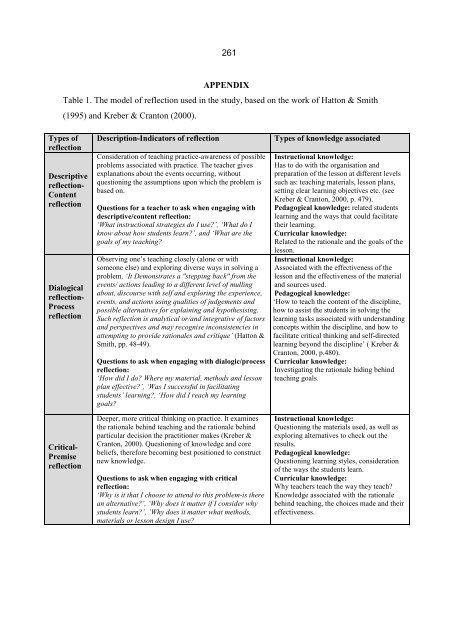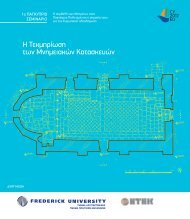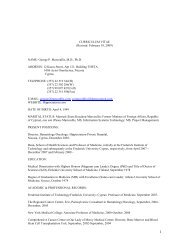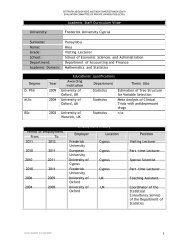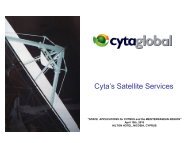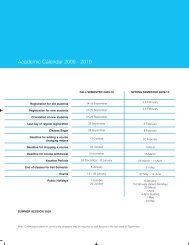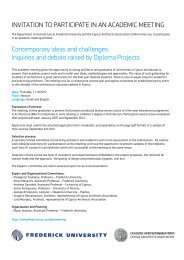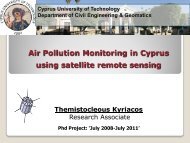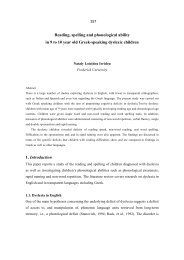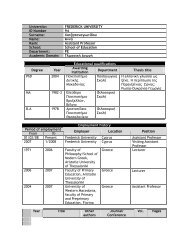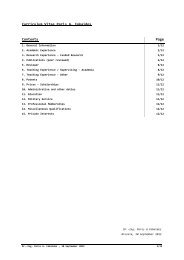Videopaper and teacher education Student teachers create ...
Videopaper and teacher education Student teachers create ...
Videopaper and teacher education Student teachers create ...
Create successful ePaper yourself
Turn your PDF publications into a flip-book with our unique Google optimized e-Paper software.
261<br />
APPENDIX<br />
Table 1. The model of reflection used in the study, based on the work of Hatton & Smith<br />
(1995) <strong>and</strong> Kreber & Cranton (2000).<br />
Types of<br />
reflection<br />
Descriptive<br />
reflection-<br />
Content<br />
reflection<br />
Dialogical<br />
reflection-<br />
Process<br />
reflection<br />
Critical-<br />
Premise<br />
reflection<br />
Description-Indicators of reflection Types of knowledge associated<br />
Consideration of teaching practice-awareness of possible<br />
problems associated with practice. The <strong>teacher</strong> gives<br />
explanations about the events occurring, without<br />
questioning the assumptions upon which the problem is<br />
based on.<br />
Questions for a <strong>teacher</strong> to ask when engaging with<br />
descriptive/content reflection:<br />
‘What instructional strategies do I use?’, ‘What do I<br />
know about how students learn?’, <strong>and</strong> ‘What are the<br />
goals of my teaching?<br />
Observing one’s teaching closely (alone or with<br />
someone else) <strong>and</strong> exploring diverse ways in solving a<br />
problem. ‘It Demonstrates a "stepping back" from the<br />
events/ actions leading to a different level of mulling<br />
about, discourse with self <strong>and</strong> exploring the experience,<br />
events, <strong>and</strong> actions using qualities of judgements <strong>and</strong><br />
possible alternatives for explaining <strong>and</strong> hypothesising.<br />
Such reflection is analytical or/<strong>and</strong> integrative of factors<br />
<strong>and</strong> perspectives <strong>and</strong> may recognise inconsistencies in<br />
attempting to provide rationales <strong>and</strong> critique’ (Hatton &<br />
Smith, pp. 48-49).<br />
Questions to ask when engaging with dialogic/process<br />
reflection:<br />
‘How did I do? Where my material, methods <strong>and</strong> lesson<br />
plan effective?’, ‘Was I successful in facilitating<br />
students’ learning?, ‘How did I reach my learning<br />
goals?<br />
Deeper, more critical thinking on practice. It examines<br />
the rationale behind teaching <strong>and</strong> the rationale behind<br />
particular decision the practitioner makes (Kreber &<br />
Cranton, 2000). Questioning of knowledge <strong>and</strong> core<br />
beliefs, therefore becoming best positioned to construct<br />
new knowledge.<br />
Questions to ask when engaging with critical<br />
reflection:<br />
‘Why is it that I choose to attend to this problem-is there<br />
an alternative?’, ‘Why does it matter if I consider why<br />
students learn?’, ’Why does it matter what methods,<br />
materials or lesson design I use?<br />
Instructional knowledge:<br />
Has to do with the organisation <strong>and</strong><br />
preparation of the lesson at different levels<br />
such as: teaching materials, lesson plans,<br />
setting clear learning objectives etc. (see<br />
Kreber & Cranton, 2000, p. 479).<br />
Pedagogical knowledge: related students<br />
learning <strong>and</strong> the ways that could facilitate<br />
their learning.<br />
Curricular knowledge:<br />
Related to the rationale <strong>and</strong> the goals of the<br />
lesson.<br />
Instructional knowledge:<br />
Associated with the effectiveness of the<br />
lesson <strong>and</strong> the effectiveness of the material<br />
<strong>and</strong> sources used.<br />
Pedagogical knowledge:<br />
‘How to teach the content of the discipline,<br />
how to assist the students in solving the<br />
learning tasks associated with underst<strong>and</strong>ing<br />
concepts within the discipline, <strong>and</strong> how to<br />
facilitate critical thinking <strong>and</strong> self-directed<br />
learning beyond the discipline’ ( Kreber &<br />
Cranton, 2000, p.480).<br />
Curricular knowledge:<br />
Investigating the rationale hiding behind<br />
teaching goals.<br />
Instructional knowledge:<br />
Questioning the materials used, as well as<br />
exploring alternatives to check out the<br />
results.<br />
Pedagogical knowledge:<br />
Questioning learning styles, consideration<br />
of the ways the students learn.<br />
Curricular knowledge:<br />
Why <strong>teacher</strong>s teach the way they teach?<br />
Knowledge associated with the rationale<br />
behind teaching, the choices made <strong>and</strong> their<br />
effectiveness.


